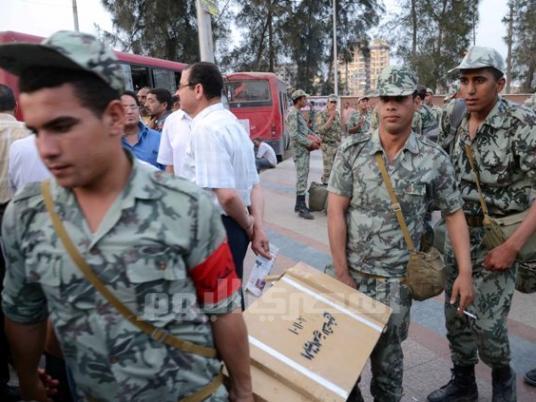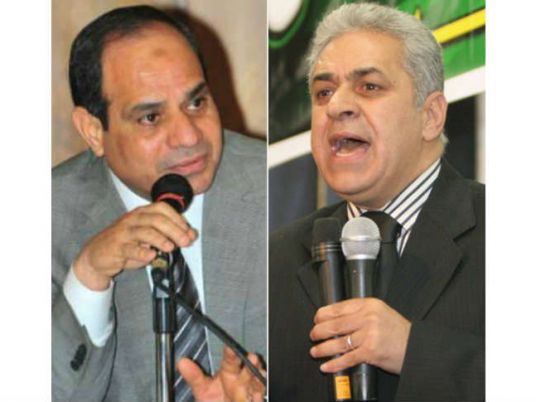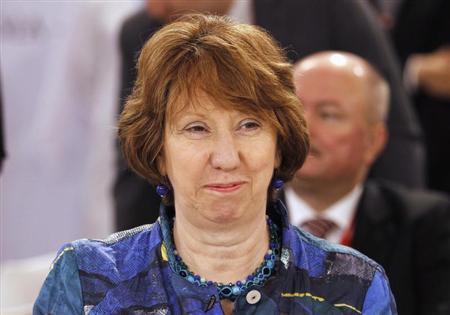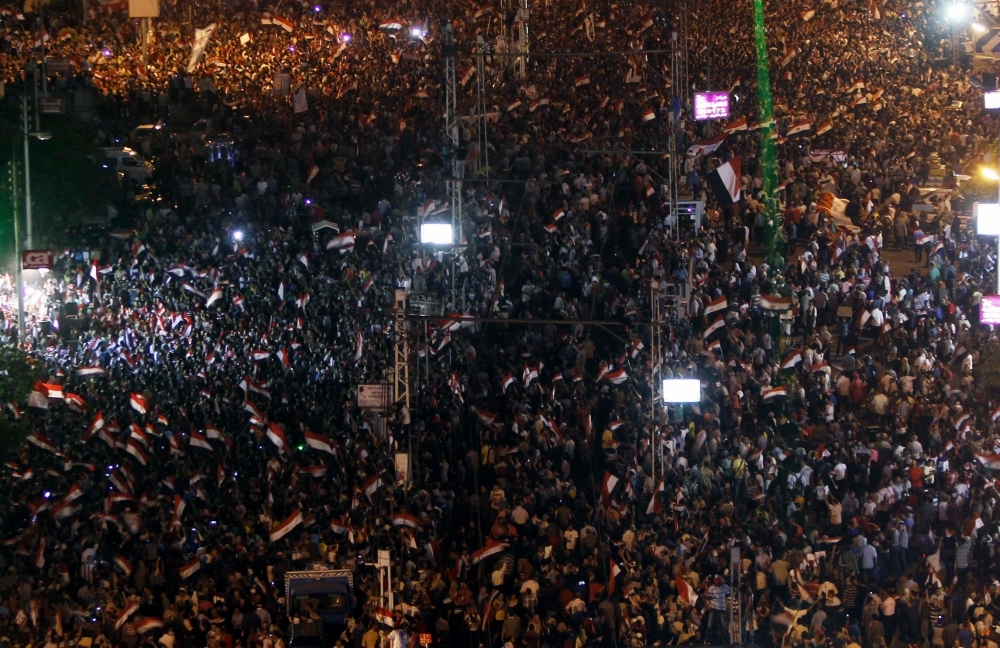
One day prior to the first round of the presidential election, Egypt’s newspapers focus their coverage almost exclusively on what is being described as the country’s first free and fair presidential race.
Headlines and articles focus on the results of expatriate voting and a host of reported irregularities ahead of domestic voting, along with election-monitoring efforts and measures.
Voting results of expatriate Egyptians were published Wednesday, although different papers published divergent results. According to results published in the new independent Al-Dostour Al-Watany newspaper, the results of 82,935 ballots cast in 72 different countries have been counted, but the votes from Saudi Arabia — which is home to about half of all Egyptian voters abroad — were yet to be determined. Voting in Saudi Arabia has been marred by allegations of ballot buying on the part of the Muslim Brotherhood, and its political arm, the Freedom and Justice Party.
According to Al-Dostour Al-Watany, out of 11 candidates, former Muslim Brotherhood member Abdel Moneim Abouel Fotouh leads the race abroad, followed by Nasserist Hamdeen Sabbahi. In third place is the Muslim Brotherhood’s Mohamed Morsy, followed by former Mubarak-era Foreign Minister Amr Moussa in fourth place. In fifth place is former Prime Minister Ahmed Shafiq, followed by moderate Islamist Mohamed Selim al-Awa. Leftist labor lawyer Khaled Ali was seventh and retired judge Hesham al-Bastawisi followed.
Different results are published in the pages of the Muslim Brotherhood’s newspaper, Freedom and Justice. Claiming to have the comprehensive final results of expat voting, Freedom and Justice’s chief headline announces, “Morsy in first place with 37 percent of Egyptian expatriate vote.”
Freedom and Justice’s statistics claim Morsy is the leading candidate among Egyptians abroad, while Abouel Fotouh trails in second place with 27 percent of the votes. Sabbahi falls in third with 14 percent, while Moussa places in fourth with 11 percent. Shafiq comes in fifth place with just seven percent. Freedom and Justice mentions in a subhead, “These election results discredit falsified polls, which were conducted without any factual basis.”
Regarding the coverage of electoral irregularities and legal loopholes, the independent Al-Watan runs a headline reading, “Presidential Elections Commission awaits report of Morsy campaigners’ breach of the 48-hour ‘no campaigning’ regulation.” Al-Watan mentions that the Freedom and Justice Party openly and blatantly violated this regulation with the distribution of 500,000 campaign fliers. Morsy’s campaigners may be referred to prosecution, and if found guilty of breaching the campaign blackout period, they could face penalties of imprisonment or fines, the paper says.
But in its own paper, the FJP denies these charges. According to Brotherhood campaigner Faisal al-Sayed, “Dr. Morsy’s campaign is abiding by the law and all its regulations.” The FJP — which openly flouted electoral regulations outside polling stations during the past parliamentary elections — claims that it is playing by the rules, and that “it is satellite TV channels and opinion polls that are breaching the ‘no-campaigning’ rule.”
Independent newspaper Al-Shorouk cites other electoral irregularities. “Martyrs still registered to vote on electoral rosters,” reads one headline. The article explains that families of two martyred activists — Khaled Saeed and Mina Daniel — announced their surprise upon finding that the ID numbers for these deceased youths were registered as eligible voters. The article mentions that electoral rosters are not updated, and that such errors may thus allow voters to use the IDs of deceased family members to vote more than once.
Al-Dostour claims that the Brotherhood is “openly involved in ballot buying and bribery.” The article mentions that FJP campaigners are attempting to mobilize poor voters by buying their votes. Al-Dostour alleges that FJP campaigners are offering voters in impoverished neighborhoods “LE300 along with a box of food supplies,” to vote for Morsy.
The independent Youm7 newspaper reports another electoral irregularity. “14 army officers authorized to vote in electoral rosters,” reads a leading headline on the front page. By law, Egyptian army and police forces are not allowed to vote while in service. However, the names of at least 14 in-service army officers have been identified on electoral rosters at polling stations. The article explains that the Presidential Elections Commission has threatened to put on trial those officers and servicemen who are not entitled to vote if they are found casting their ballots.
The liberal opposition Al-Wafd newspaper explains, “Over 50 million voters are authorized to vote tomorrow.” Al-Wafd mentions that hundreds of judges are being deployed in polling stations nationwide. “Military planes and trains transport justices, while 200 judges decline to monitor elections due to their objections regarding their geographic distribution.” Reports indicate that 53 Egyptian human rights NGOs and around 7,000 volunteers will partake in monitoring the elections nationwide, along with four international organizations — including the Carter Center, which is headed by ex-US President Jimmy Carter.
In Al-Watan, Coptic Christian Bishop Basanti says, “The church has not decided to back Amr Moussa… Copts are free to vote as they choose.” The Bishop of Helwan and Maasara explains that the church never endorses candidates in elections. However, it must be mentioned that this was not the case during Mubarak’s rule, when the (now-deceased) Pope Shenouda III and his church openly endorsed Mubarak and his regime during previous elections.
“Tomorrow marks the end of Pharaonic rule… Egypt chooses its president” reads the chief headline in Youm7, while on the front-page of the independent Al-Tahrir Newspaper are photos of Egypt’s previous presidents/military rulers — Mohamed Naguib, Gamal Abdel Nasser, Anwar al-Sadat, Hosni Mubarak, and a blank frame. Al-Tahrir’s chief headline reads, “Tomorrow Egypt chooses the fifth” president.
In state-owned Al-Akhbar Newspaper, the front-page and its headlines focus on polishing the image of the ruling Supreme Council of the Armed Force and its uniformed troops, “The army will take to the streets to defend the will of the populace.” Al-Akhbar quotes a SCAF statement saying that, “The elections will be free and fair… We must all accept the results.”
Clarifying the bigger political picture and the controversies at hand Mohamed Hassanein Heikal writes an op-ed in Youm7 under the title, “A president without a constitution is like a marriage without a contract.” The renowned journalist and historian points out that without a constitution stipulating the president’s authorities, the upcoming elections are democratically illegitimate, incomplete and aimless.
Egypt's papers:
Al-Ahram: Daily, state-run, largest distribution in Egypt
Al-Akhbar: Daily, state-run, second to Al-Ahram in institutional size
Al-Gomhurriya: Daily, state-run
Rose al-Youssef: Daily, state-run
Al-Dostour: Daily, privately owned
Al-Shorouk: Daily, privately owned
Al-Watan: Daily, privately owned
Al-Wafd: Daily, published by the liberal Wafd Party
Youm7: Daily, privately owned
Al-Tahrir: Daily, privately owned
Freedom and Justice: Daily, published by the Muslim Brotherhood's Freedom and Justice Party
Sawt al-Umma: Weekly, privately owned
Al-Arabi: Weekly, published by the Nasserist Party
Al-Nour: Official paper of the Salafi Nour Party



